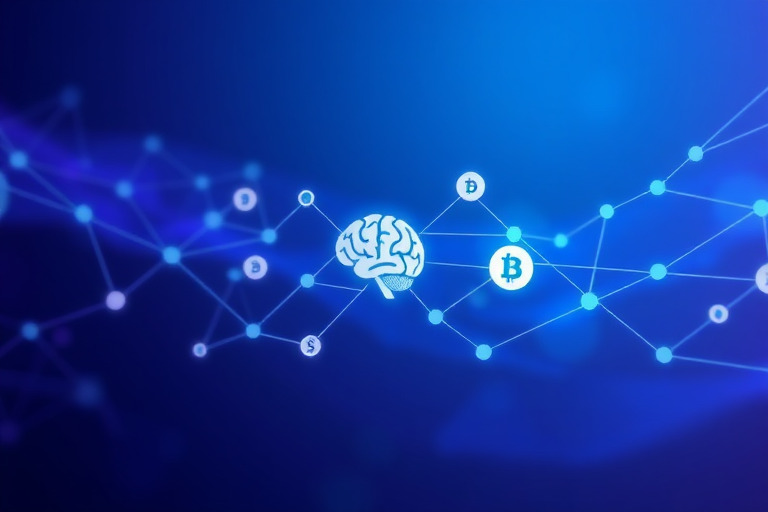The Convergence of AI and Crypto: Unlocking New Frontiers

The worlds of artificial intelligence (AI) and cryptocurrency are rapidly converging, ushering in a new era of innovation and disruption. As these two cutting-edge technologies intertwine, they are poised to revolutionize the crypto industry, enhancing security, efficiency, and user experiences. This convergence represents a paradigm shift, one that promises to unlock new frontiers and reshape the very fabric of digital finance.
AI: The Driving Force Behind Intelligent Crypto Solutions
Artificial intelligence, with its ability to process vast amounts of data, identify patterns, and make predictions, is emerging as a powerful ally in the crypto realm. By harnessing the capabilities of machine learning and deep learning algorithms, AI is being integrated into various aspects of blockchain technology, offering intelligent solutions that address some of the industry's most pressing challenges.
One of the primary applications of AI in crypto is market prediction and analysis. AI algorithms can process historical prices, trading volumes, and market sentiment indicators to forecast future trends, assisting traders and investors in making data-driven decisions . This predictive power not only enhances trading strategies but also contributes to the overall stability and efficiency of the crypto market.
Moreover, AI is playing a crucial role in crypto fraud detection and security. Advanced AI systems can continuously monitor transaction patterns and user behavior, rapidly pinpointing irregularities that could signal fraudulent activity . By adapting and learning from each incident detected, AI can bolster the security framework of cryptocurrency transactions, safeguarding users' assets and fostering
trust in the ecosystem.
Blockchain: The Foundation for Transparent and Secure AI
While AI brings intelligence and automation to the crypto industry, blockchain technology provides the foundation for transparency and security. The decentralized and immutable nature of blockchain ensures that data recorded on the ledger remains tamper-proof, establishing a new level of trust and accountability.
By leveraging blockchain technology, AI models can be stored and distributed in a secure and transparent manner, addressing the challenge of explainable AI . This integration not only enhances data integrity but also improves trust in the recommendations and decisions made by AI systems, a critical factor in the adoption of these technologies in sensitive industries like finance.
Furthermore, the combination of AI and blockchain can streamline and automate various processes within the crypto industry. AI-powered smart contracts, executed on the blockchain, can autonomously trigger actions based on predefined conditions, reducing the need for manual intervention and increasing efficiency . This automation not only enhances the speed of transactions but also minimizes the risk of human error, further strengthening the reliability of the crypto ecosystem.
The Potential Impact on the Crypto Industry
The integration of AI and blockchain technology holds the potential to reshape the crypto industry in profound ways. One area where this convergence could have a significant impact is portfolio management and optimization. AI-driven platforms can provide personalized portfolio management services, customizing investment
strategies based on individual risk profiles and preferences . By analyzing market conditions, asset performance, and portfolio diversification, these platforms can offer fine-tuned investment recommendations, ensuring that investment portfolios remain aligned with constantly changing market dynamics.
Another area poised for transformation is regulatory compliance and anti-money laundering efforts. AI algorithms can analyze transactions in real-time, comparing them against patterns typical of money laundering and other regulatory violations . As regulatory frameworks evolve, the integration of AI and blockchain can help crypto exchanges and platforms stay compliant, fostering trust and credibility
within the industry.
Moreover, the convergence of AI and blockchain could revolutionize the way smart contracts are analyzed and optimized. AI systems can scrutinize smart contract code, identifying vulnerabilities and inefficiencies, and simulating various operational scenarios to predict their behavior under different conditions . This capability not only enhances the reliability and security of smart contracts but also
streamlines their performance, paving the way for more complex and sophisticated decentralized applications (dApps).
Challenges and Considerations
While the integration of AI and blockchain technology holds immense promise, it is not without its challenges. One of the primary concerns is the need for robust data privacy frameworks and standards. As AI models become more integrated with blockchain networks, ensuring user privacy and maintaining trust will be paramount . Additionally, the issue of AI bias must be addressed, as encoding biases into an immutable ledger could result in systematic flaws and raise ethical
concerns.
Another challenge lies in the interoperability between different blockchain networks and AI platforms. Establishing standards and protocols for seamless data sharing and compatibility will be crucial for harnessing the full potential of these technologies . Furthermore, public awareness and education surrounding the convergence of AI and blockchain will play a vital role in building trust and increasing user demand for AI-powered crypto solutions.
Conclusion
The convergence of artificial intelligence and blockchain technology represents a transformative force within the crypto industry. By combining the analytical prowess of AI with the security and transparency of blockchain, this integration has the potential to enhance market efficiency, strengthen security measures, and drive innovation in areas such as portfolio management, regulatory compliance,
and smart contract optimization.
However, as with any disruptive technology, challenges and considerations must be addressed to ensure responsible and ethical implementation. Robust data privacy frameworks, mitigation of AI biases, and seamless interoperability between systems will be crucial for realizing the full potential of this convergence.
As the crypto industry continues to evolve, the integration of AI and blockchain will undoubtedly play a pivotal role in shaping its future. By embracing this convergence and addressing its challenges head-on, the industry can unlock new frontiers, fostering trust, transparency, and innovation in the digital finance landscape.
Sources:
https://pixelplex.io/blog/ai-and-crypto/
https://blog.chain.link/blockchain-ai-use-cases/
https://readwrite.com/ai-in-crypto-trading/
https://www.tokenmetrics.com/blog/role-of-artificial-intelligence-in-crypto-industry
https://coindcx.com/blog/cryptocurrency/how-ai-is-transforming-the-crypto-industry/
https://www.paysafe.com/en/resource-center/how-will-ai-impact-crypto/
https://unchainedcrypto.com/use-cases-of-ai-in-blockchain/
https://b2broker.com/news/how-ai-will-affect-cryptocurrency-market/




